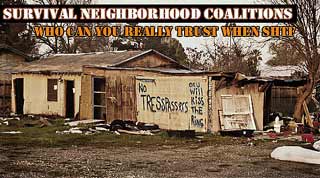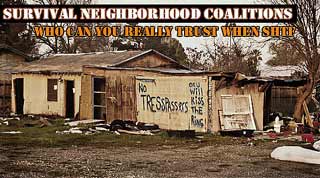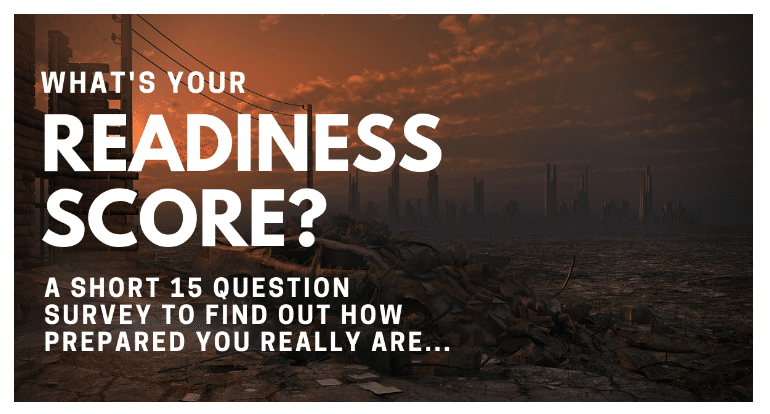 How To Build A Survival Coalition From Scratch
How To Build A Survival Coalition From Scratch
Let’s assume that you have decided not to bug out; you have decided to stay home, using your house as a survival base.
Not every survival scenario ends with you living in a tent or shelter made of branches.
In a post-apocalyptic (or at the least post-large-scale disaster) world, people will fight for survival, food, water, and security.
Let’s assume you have a plan for this
- Maybe you have been stockpiling food and supplies
- Perhaps you’re adequately armed
- You’ve educated yourself and know exactly how to defend your home
In many cases, your best chances of survival are on turf you are familiar with – home-field advantage and all that.
Two problems with this must be addressed, preferably before disaster strikes.
- The first: you are only one person.
- The second: you may be surrounded by neighbors.
As A Way To Introduce You To Skilled Survival, We’re Giving Away Our #78 Item Complete Prepper Checklist. Click Here To Get Your FREE Copy Of It.
So What’s Wrong With Self-Sufficiency?
Simple. You can’t do it all alone.
Just because you are living in your home does not mean you can lock the front door and go to sleep.
If the nature of the disaster is such that food and resources become scarce, you can bet there are bad guys out there who have not prepared as you have.
Don’t let the fact they haven’t stockpiled fool you into believing they haven’t prepped. For some of the more ruthless of our brothers, prepping means firepower and the will to use it.
These guys figure, why waste time and money stockpiling food or gear when they can take what they need from someone who has it?
This is a valid argument on their part. It is damn near Darwinian.
The lion doesn’t think twice about running the cheetah off from a kill.
The ruthless man who is willing to exert his ruthlessness can generally get what he needs. This factor multiplies if you are talking about many ruthless people working together.
The police won’t be there to stop them, and if they leave no witnesses, no one can testify later should civilization reemerge.
You can’t provide 24-hour security for your family – and can you really count on your wife or ten-year-old on the roof with the deer rifle to cover the hours you have to sleep?
To make matters worse, surviving will require more of you than just standing guard. You need allies to share this responsibility.
This is where neighbors may come into play…your makeshift survival coalition for those who plan to stay.
I listed two problems above, the second of which was neighbors.
Neighbors Are A Double-Edged Sword
Just like in normal times, they can be both an asset and a liability – in some cases, a hindrance.
A responsible, dependable, skilled, friendly neighbor with high moral standards can be a powerful asset, just as a weak, unreliable, unskilled, unmotivated waste of DNA can be a liability.
Neighborhoods can come together to forge alliances for mutual protection and support, but only if the right people are involved. The wrong people can lead to mutual destruction.
You need to know which of these people live around you.
How Do You Form A Neighborhood Survival Coalition?
Start now.
You can’t wait until disaster strikes. That would be rolling the dice with your family’s fate.
You need to know who you are dealing with. And begin laying the foundations for a future survival coalition – let’s call them friendships.
You don’t want to come across as the nutjob extremist in the cul-de-sac, which you are not. You are just a rational person forging relationships for mutual interests.
In the best-case scenario, the efforts will yield friends who will help you swap out an engine in your truck or buddies you can go fishing with on weekends.
Nothing wrong with a few more friends.
So put yourself out there if you haven’t already. Introduce yourself and your family to your neighbors, invite them over, have a block party, swap home improvement help…whatever.
One evening on the street, barb-cueing and drinking beer, and you’ll know exactly with whom you are dealing.
Sometimes you can tell whom you are dealing with just by their handshake. For most people, you can usually tell if someone is an asshole or a patsy in the first five minutes.
Within an hour, you’ll have a pretty good understanding of who these people are and if they are reliable human beings or just oxygen thieves.
As you get to know these people, you may steer the conversation toward things like camping, hunting, fishing, firearms, martial arts, etc.
People love to talk about their hobbies. It’s a completely natural thing that will tell you volumes about these people.
Now you don’t have to be friends with all these people. Truth be told, that might even be a mistake.
You may want to keep a healthy distance from a few. They may prove to be ruthless guys not looking to cooperate.
That being said, don’t immediately disqualify the ruthless guy from your survival coalition.
In fact, the ruthless guy who is willing to cooperate and has a modicum of morality and dependability can be a great addition to your team.
So now you know the good from the bad, the wheat from the chaff, the cream from the milk. Although you may be forging friendships with the wheat – don’t piss off the chaff.
Keep on friendly terms with everyone in your neighborhood, if possible. That asshole may change his colors when TSHTF.
So does this mean you must spill the beans to your new friends that you are building an end-of-the-world security force?
No. Bad idea.
No matter how you do it, you won’t sound rational to the average neighbor – and to be taken seriously later, you have to be thought of as rational today.
Just keep a mental list of your prospective survival coalition team and the skills, tools, equipment, and vehicles they possess.
File it away in the back of your mind for future use, and enjoy your new friendships.
So what if the seeds of disaster start to sprout? There are disaster scenarios where the general public can see the event coming (like an economic collapse) – sometimes for weeks or months before it arrives.
In these cases, keep current on the news and ensure your friends in the neighborhood are also current.
Encourage talk amongst yourselves about what’s coming.
You may be surprised when your friends start talking about making plans to deal with the coming disaster.
Work the mutual protection concept into the conversation slowly and put your friends at ease with the notion you’ll all take care of each other.
So do you tell your newfound survival coalition about your stockpile of food?
- Underground shelter?
- Firearms?
- Your survival radio communications?
Remember the number one rule for both bunkers and stockpiles? “Don’t talk about your bunker or stockpile?”
Well, this is still a good rule, but as the time of the disaster approaches, you will have to share this information at some point – that is, if you want mutual protection.
Still, be wary about with whom you share it. Some neighbors not quite in the group but on the cusp of acceptance may be left in the dark for a while until you can ascertain their true intentions – it’s a judgment call – like most things in survival.
As A Way To Introduce You To Skilled Survival, We’re Giving Away Our #78 Item Complete Prepper Checklist. Click Here To Get Your FREE Copy Of It.
This Brings Me To Adding Millennials To Your Survival Coalition
These young adults are very different from those we reared back in the Twentieth.
On the surface, some of these young people may not seem to possess skills useful to survival, but on the other hand, many of these kids are really, really smart and may prove incredibly adaptable under adverse conditions.
They are an untested hypothesis – an unknown quantity.
It may serve you well to welcome them to your group if they possess the right personality rather than the right skill set.
On the other hand, if they seem worthless and completely lost without a cell phone, they might be.
Another judgment call.
There are those weak souls out there, often Liberal types, who don’t seem to have a self-preservation instinct.
They oppose firearms, national defense, corporations, national borders, and mandatory sentencing for violent criminals.
They are very trusting souls when it comes to people they really should not trust.
These types are more concerned about their environmental impact than they are about staying alive -but maybe that’s because staying alive has never been in doubt until disaster strikes.
These people could be a terrible hindrance to your efforts. Don’t give these people critical jobs or place too much trust in them. They don’t see the world as it really is.
Given time, Nature they want to protect will eat them up and shit them out. In the meantime, you may have to deal with them.
Building your survival coalition, like friendships, takes a little work, but it absolutely necessary to the long-term security of you and your family.
Better to find out now which neighbors can help and which can hurt your chances of survival.
Come together and survive.
Prepare, Adapt, and Overcome,
“Just In Case” Jack
P.s. Are you ready for the tough times ahead?
Find out now by taking my short Readiness Score Quiz – it’s absolutely free.
Once complete, you’ll know exactly where you stand on the “fragile” vs.” resilient” spectrum.
So click here to start the Quiz….And don’t worry; the questions are so easy a 3rd grader could answer them.
Click on the image to begin the Quiz and find out once and for all if you’re part of “The Fragile Masses” or “The Resilient Few.”
Top Photo Credit
The post Survival Coalition: Who Can You REALLY Trust When SHTF appeared first on Skilled Survival.



 How To Build A Survival Coalition From Scratch
How To Build A Survival Coalition From Scratch